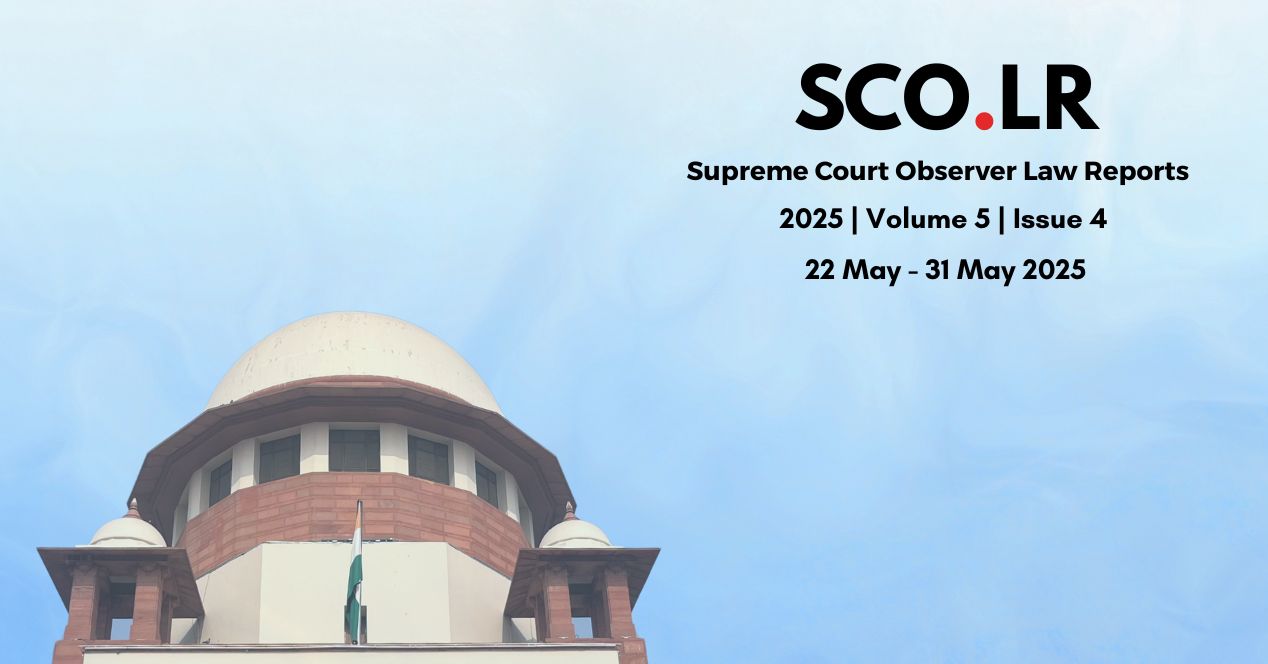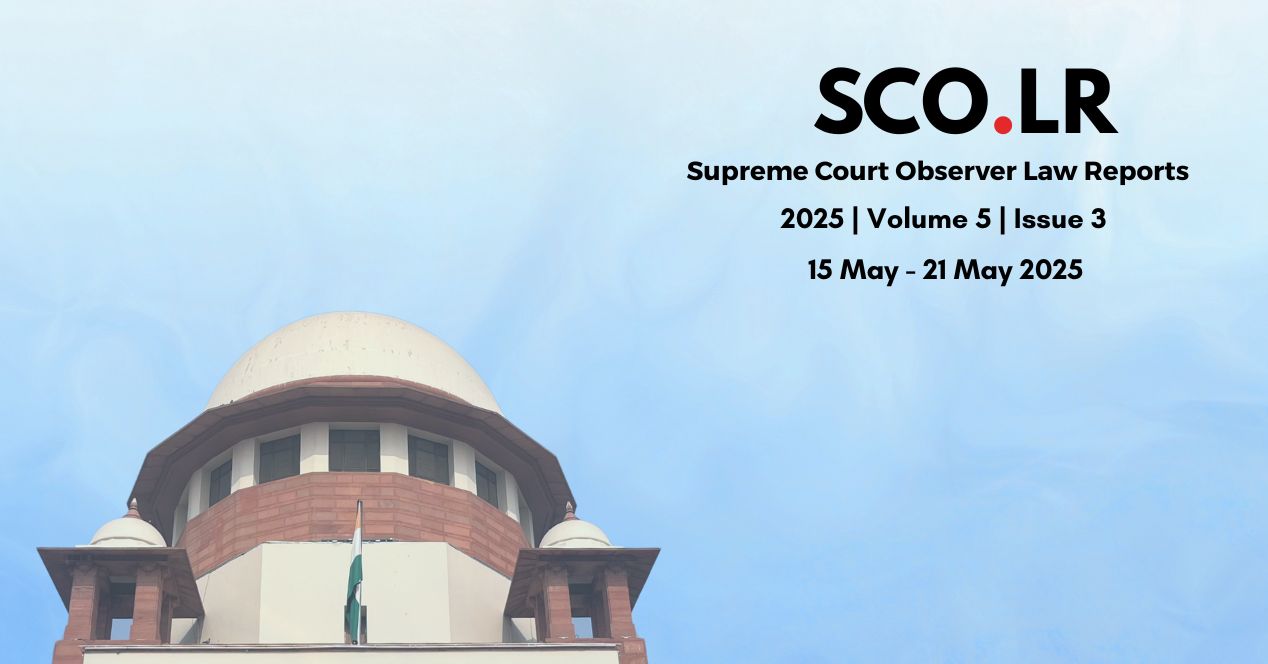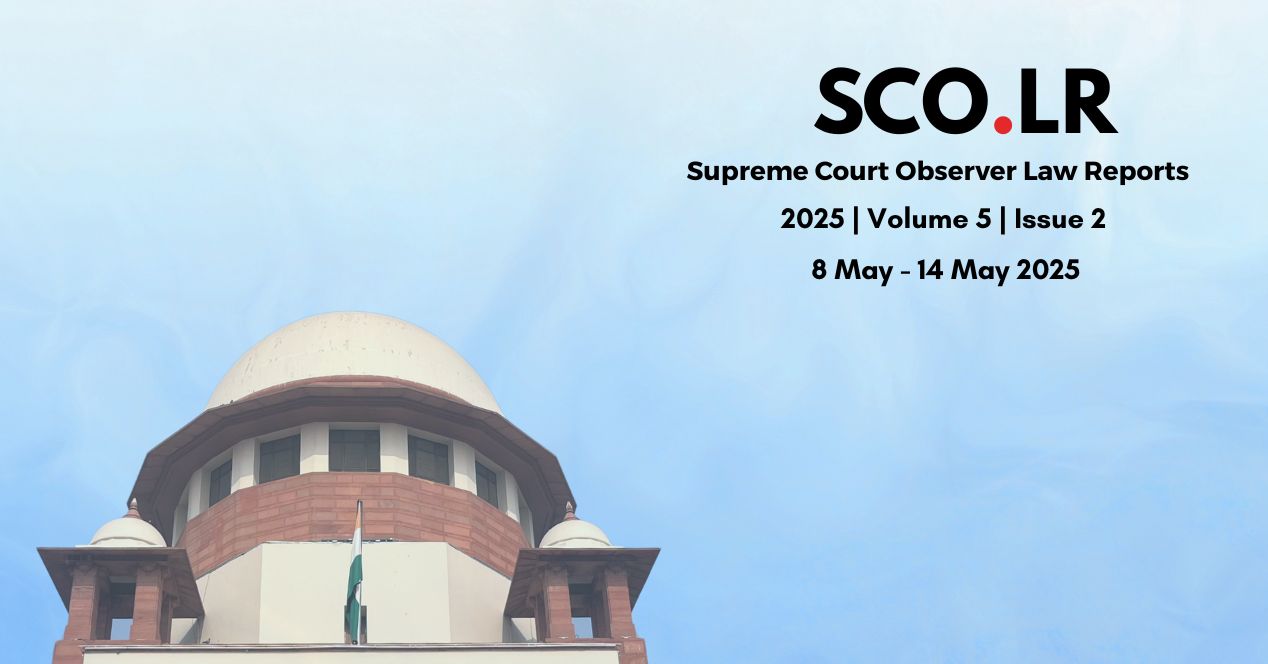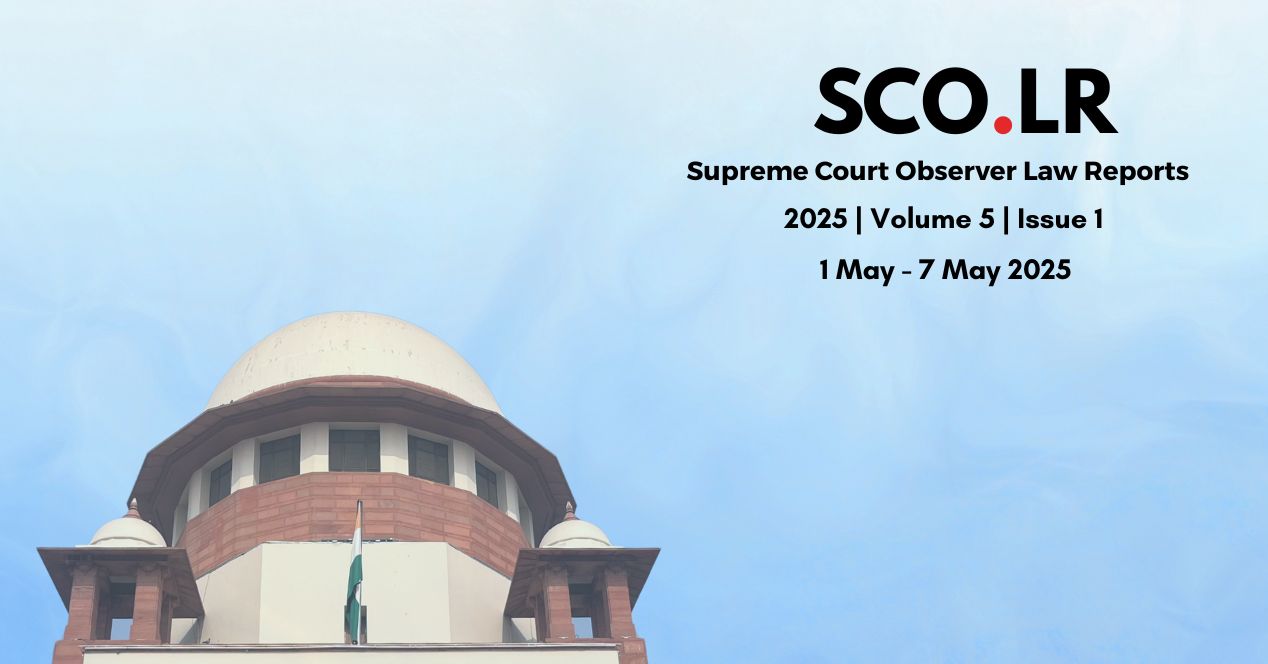Analysis
SCO.LR | 2025 | Volume 6 | Issue 1
In this Issue of SCO.LR, we summarise five significant and unmissable judgements from 1 June to 8 June 2025

Here’s the first SCO.LR of the month!
Volume 6 Issue 1 brings you key judgments from the first week of June 2025. Judgements this week deal with how courts should assess circumstantial evidence, their power to enhance sentences, the use of preventive detention and the recognition of criminal conduct equivalent to extortion.
We’ve also launched a brand new SCO.LR page—now in HTML format. You can link to individual paragraphs in your research and assignments. Just look for the 🔗 on the right!
Tell us if SCO.LR has helped your work or how we can make it better. Write to us at admin@scobserver.in. Happy reading!
The Supreme Court Observer Law Reports 2025
SCO.LR | Vol 6 | Issue 1
1 June – 8 June 2025
**********
Courts Must Compare Prosecution and Defence Statements in Cases of Circumstantial Evidence
Vaibhav v State of Maharashtra
4 June 2025
Citations: 2025 INSC 800 | 2024 SCO.LR 6(1)[1]
Bench: Justices B.V. Nagarathna and S.C. Sharma
The Supreme Court held that in cases where a court has relied on circumstantial evidence, it must compare the prosecution’s evidence with that of the defence. Where two views exist, the one favouring the accused should be taken.
Vaibhav, the accused, claimed that he found Mangesh, the deceased, in a pool of blood along with his father’s pistol. He then disposed of the body and concealed the death. The prosecution claimed that this was an act of homicidal death. Vaibhav claimed it was a case of accidental death. The Bombay High Court upheld Vaibhav’s conviction.
The Court overturned the decision of the High Court as it did not test Vaibhav’s version of events against the surrounding facts and circumstances. The Court set aside Vaibhav’s conviction under Section 302 of the Indian Penal Code, 1860 and Section 5 read with Section 29 of the Arms Act, 1959. It sustained the conviction on Section 201 of the IPC for causing the disappearance of evidence.
Key word/phrases: Bombay High Court—Judgment Partially Set Aside—Circumstantial Evidence—Compare Version of Events— If two Views Exist—Favour Accused—Section 302 Indian Penal Code— Sections 5 and 29 Arms Act —Conviction Set Aside
Read the Judgement here.
**********
Appellate Court Cannot Enhance Sentence
Nagarajan v State of Tamil Nadu
4 June 2025
Citations: 2025 INSC 802 | 2024 SCO.LR 6(1)[2]
Bench: Justices B.V. Nagarathna and S.C. Sharma
The Supreme Court held that the appellate court cannot enhance the sentence in cases where the appeal is filed by the accused.
The appellant trespassed into the house of his neighbour and hugged her. She later committed suicide. The Trial Court convicted the appellant under Sections 354 and 448 of Indian Penal Code, 1860 and acquitted him of the charge under Section 306 of IPC. The High Court dismissed his appeal against his conviction. Using its suo moto Criminal Revision Petition, it convicted the appellant under Sections 306 and sentenced him with rigorous imprisonment for five years.
The Supreme Court held that the High Court cannot act as a revisional court, particularly when no appeal or revision has been filed either by the State, victim or complainant for seeking enhancement of sentence against accused. No appellant, by filing an appeal, can be made worse-off than what he was.
Key word/phrases: High Court overruled—Charge of trespass and outraging of modesty—Trial Court convicts accused for trespass and outraging of modesty—finds evidence insufficient for abetment of suicide—High Court uses its suo moto revisional powers—finds appellant guilty and enhances sentence—Supreme Court finds High Court has no such power
Read the Judgement here.
**********
Limitation under 468 CrPC Begins from Date of Filing Complaint
Ghanshyam Soni v State (Govt. of NCT of Delhi)
4 June 2025
Citations: 2025 INSC 803 | 2025 SCO.LR 6(1)[3]
Bench: Justices B.V. Nagarathna and S.C. Sharma
The Supreme Court held that to calculate the limitation under Section 468 of the Code of Criminal Procedure, 1973, the relevant date is the date of filing of the complaint, not when the Magistrate takes cognisance.
The complainant filed a dowry harassment complaint against her husband and his family in 2002, alleging physical and mental abuse in 1999. An FIR was registered under Sections 498A, 406 and 34 of the Indian Penal Code, 1860 in 2002. The Magistrate took cognisance in 2004. The Sessions Court discharged the accused stating that the magistrate had taken cognisance of the case five years, whereas the limitation period was three years. The Delhi High Court held that the complaint was within time.
The Supreme Court upheld the High Court order and held that the complainant was not late in approaching the Court.
Key words/phrases: FIR for dowry harassment in 2002—Magistrate takes cognisance in 2004—Sessions court discharges case as barred by limitation—High Court reverses—Supreme Court holds limitation begins from date of filing complaint—not date of magistrate taking cognisance
Read the Judgement here.
**********
Threat of life or injury for extortion does not need transfer of property
M/S. Balaji Traders v The State of U.P.
5 June 2025
Citations: 2025 INSC 806 | 2025 SCO.LR 6(1)[4]
Bench: Justices Sanjay Karol and Manoj Misra
The Supreme Court held that delivery of property is not necessary to charge a person under Section 387 of the Indian Penal Code, 1860 for “putting a person in fear of death or of grievous hurt, in order to commit extortion.” The Court clarified that Section 387 criminalises a step prior to the actual extortion where property delivery is essential.
The complainant and the accused run companies with the same name, M/S Balaji Traders and are involved in an ongoing intellectual property dispute. The complainant claimed that the accused threatened him with rifles, asking him to close down his business or pay five lakh rupees every month. The Trial Court found a prima facie offence under Section 387 and issued summons. The Allahabad High Court found that for a Section 387 offence to be made out, the victim must have transferred property or security to the accused.
The Supreme Court overturned the High Court decision. The Bench held that Sections 385, 387, and 389 IPC are designed to punish the accused for an act committed for the purpose of extortion and not extortion itself.
Key words/phrases: Section 387 IPC — Property transfer not essential — Threat of death or grievous hurt — Intellectual Property dispute — Prima facie offence upheld — Allahabad High Court decision overturned — Strict interpretation of criminal law
Read the Judgement here.
**********
Preventive detention not an alternative for seeking cancellation of bail
6 June 2025
Citations: 2025 INSC 809 | 2025 SCO.LR 6(1)[5]
Bench: Justices Sanjay Karol and Manmohan
The Supreme Court held that preventive detention is not the appropriate remedy for a detaining authority if an accused violates their bail conditions.
The appellant, who was the wife of the detenu, had filed an appeal against a Kerala High Court judgement which had upheld the detention of her husband under the Kerala Anti-Social Activities (Prevention) Act, 2007. The husband was described as a “notorious goonda” who had several criminal cases pending against him. The detaining authorities said that he had violated his bail conditions and that his release would threaten “public order” .
The Supreme Court reiterated that preventive detention should be exercised in rare instances and was an exception to the protection of life and liberty under Article 21. The Bench pointed out that no application was made to cancel the bail granted to the detenu. They noted that the detaining authority did not clearly make a case for needing preventive detention.
Key words/phrases: Preventive detention—exception to Article 21—threat to public order—Kerala Anti-Social Activities (Prevention) Act, 2007—no preventive detention when alternate remedy of cancellation of bail is available
Read the Judgement here.




